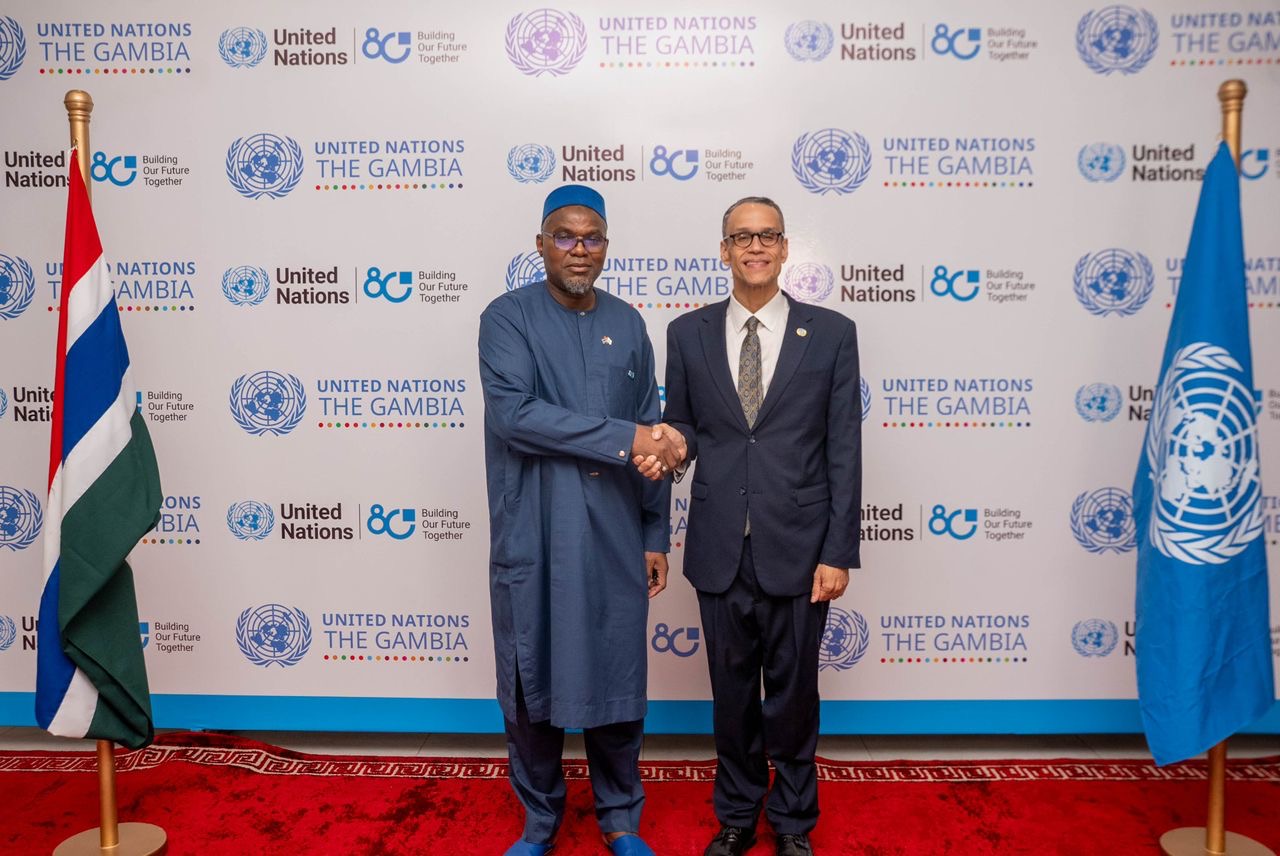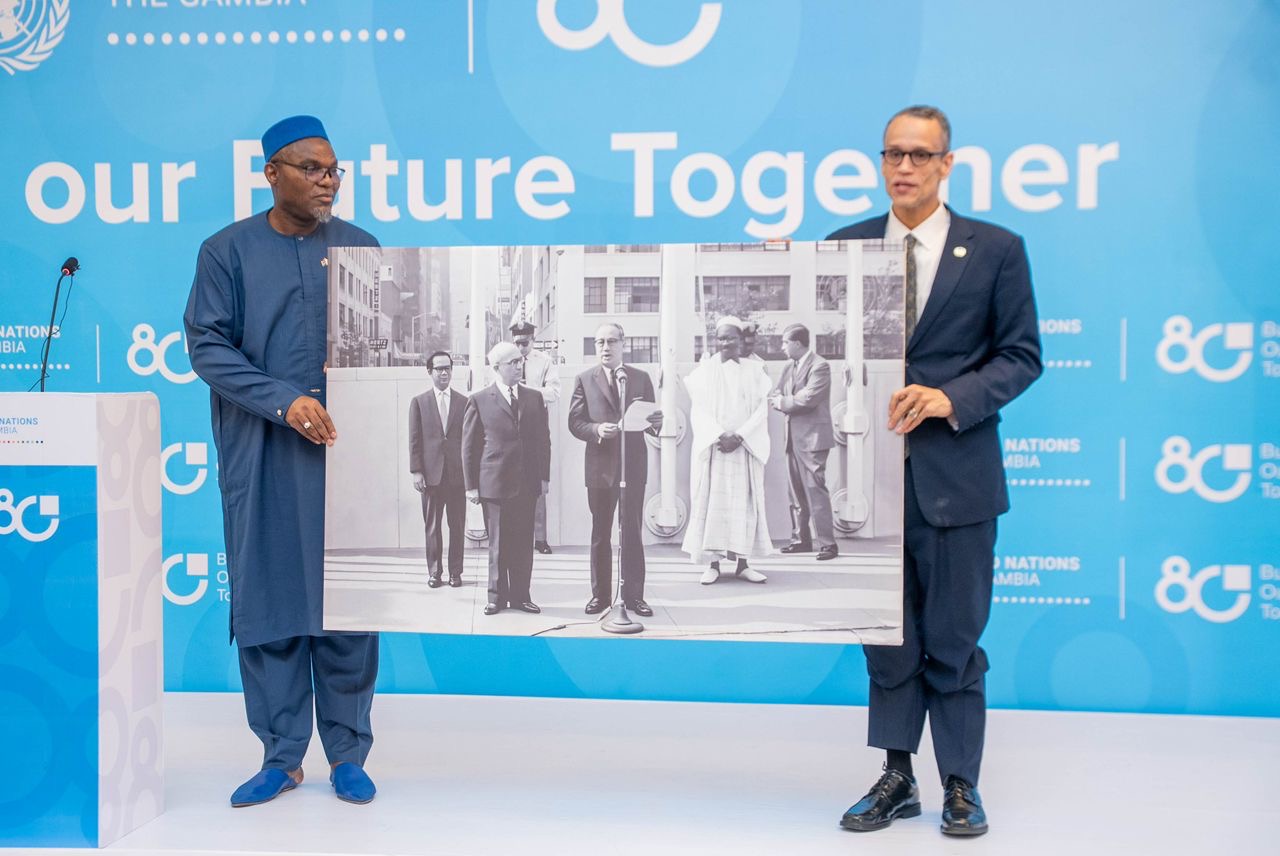Gambiaj.com – (BANJUL, The Gambia) – The Office of the United Nations Resident Coordinator in The Gambia has commemorated the 80th Anniversary of the United Nations, celebrating eight decades of international cooperation, peace, and development.
The event, held in Banjul, marked 80 years since the founding of the UN on 24 October 1945 and offered an opportunity to reflect on the organization’s global and national impact in promoting peace, sustainable development, human rights, and humanitarian action.
The ceremony was presided over by Vice President Muhammed B.S. Jallow, who delivered the keynote address on The Gambia’s enduring partnership with the UN and the importance of multilateralism in tackling global challenges.
Vice President Jallow on UN–Gambia Partnership
In his address, Vice President Jallow hailed the United Nations as “the best proof of multilateralism,” commending its role in bringing nations together across continents and cultures to confront shared challenges and pursue common aspirations.
He reaffirmed The Gambia’s commitment to the principles enshrined in the UN Charter and to the UN80 vision of “Building Our Future Together.”
“The relationship between The Gambia and the United Nations is one of enduring partnership and deep mutual respect,” VP Jallow said, recalling that since joining the UN in 1965, The Gambia has benefited immensely from its support across every aspect of national development.
“From strengthening democracy, good governance, and human rights to advancing healthcare, education, agriculture, food systems, social protection, clean energy, climate action, digital transition, and food security, the UN has been one of our strongest partners in our nation’s progress toward sustainable development,” he said.
The vice president expressed gratitude to the UN for its continued presence in The Gambia through its agencies, funds, and programs, noting that “the UN family has consistently demonstrated that global solidarity can yield tangible results in the lives of ordinary Gambians.”
He cited contributions from various UN bodies, including UNDP, UNICEF, WHO, WFP, FAO, UNFPA, UNAIDS, ITC, UN-Habitat, UN Women, the World Bank, IMF, IFAD, UNESCO, and OHCHR, all of which, he said, play “crucial roles in advancing our national development agenda.”
Call for Reform of Global Financial Systems
Vice President Jallow highlighted the financial constraints facing many African nations in achieving the Sustainable Development Goals (SDGs), noting that many countries spend more on debt servicing than on critical investments in health, education, and infrastructure.
“This reality is morally untenable and economically unsustainable,” he said, calling for “a reformed international financial architecture that is fit for purpose in the 21st century.”
He welcomed the UN Secretary-General’s call for an SDG stimulus and global financial system reform, urging development partners to translate commitments into concrete action.
On the anniversary’s theme, “Building Our Future Together,” the vice president underscored the central role of youth, describing them as “not merely beneficiaries of development, but its architects and drivers.”
He stressed the need to invest in quality education, skills development, and employment opportunities, while ensuring youth participation in decision-making at all levels.
“The Gambia is committed to harnessing our demographic dividend by creating an enabling environment where young Gambians can innovate, lead, and thrive,” VP Jallow said, urging the UN to continue prioritizing youth engagement in its work.

UN Resident Coordinator Reflects on 80 Years of Global Cooperation
In his remarks, Mr. Karl Frederick Paul, the UN Resident Coordinator in The Gambia, described the 80th anniversary as “a moment to reflect, reconnect, and reimagine together.”
He said the UN was founded on “the simple yet powerful conviction that when humanity stands together, we can transform even the greatest challenges into opportunities.”
“Eighty years ago, amid a world devastated by war, nations united with courage and conviction to lay the foundations for peace and the protection of human dignity,” he said. “Tonight, here in The Gambia, we celebrate that same enduring spirit of unity, partnership, and faith in what we can achieve together.”
Mr. Paul praised The Gambia for placing development, peace, and multilateralism at the heart of its diplomacy since 1965 and commended its “remarkable progress in governance, democracy, peace, and stability.”
He noted that The Gambia continues to undertake bold reforms to diversify its economy, advance energy transition, strengthen food security, and invest in youth and women.
The UN official also paid tribute to Gambian peacekeepers serving around the world:
“Across the globe, Gambian peacekeepers wear the blue helmet with pride. They stand in some of the most fragile places on earth, protecting lives, building trust, and carrying the hopes of humanity. Their service embodies the very spirit of the United Nations.”
Strengthening Cooperation Through the UN Framework
Mr. Paul highlighted that through the 2024–2028 UN Sustainable Development Cooperation Framework, 17 UN agencies, funds, and programs are working closely with national institutions to accelerate progress on the SDGs.
“The United Nations and The Gambia share a relationship built on trust, respect, partnership, and a shared vision for progress,” he said, noting that the partnership has strengthened democracy, human rights, and inclusive development.
He outlined the ongoing contributions of various UN entities, from UNICEF’s work in education and child protection to UNDP’s governance and justice reforms, WHO’s support for resilient health systems, and WFP and FAO’s efforts to combat food insecurity and malnutrition.
Other agencies, including UNFPA, UN Women, UN-Habitat, OHCHR, ITC, IFAD, UNESCO, IOM, UNODC, and UNAIDS, continue to advance gender equality, sustainable urbanization, human rights, trade, agriculture, biodiversity, safe migration, and the fight against organized crime and disease.
Mr. Paul concluded by reaffirming the UN’s commitment to supporting The Gambia’s development aspirations:
“Together with our international financial institutions, the World Bank and IMF, we remain dedicated to promoting macroeconomic stability, sound fiscal management, and inclusive growth.”










